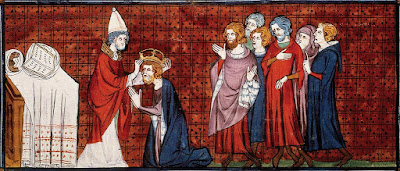The post Charlemagne and the Popes mentioned Pope Leo III taking an Oath of Purgation to "prove" his innocence of accusations made against him. It seems strange to a modern audience that simply swearing that you are innocent is enough to exonerate you, but the Middle Ages believed that God who sees the sparrow fall observes your deeds and will treat you accordingly if you lie. Therefore, swearing an oath puts yourself firmly into God's hands for judgment, and no one in his right mind would do that if he were actually guilty.
There were two levels of purgation [from Latin purgare "to cleanse" by way of Old French purgacion]. Vulgar Purgation was the clearing of one's name through ordeals such as trial by fire or water. You can read about those here.
The other form was Canonical Purgation, the act of clearing your name by swearing your innocence in the presence of reliable witnesses who would state their trust in your statement. (The number of witnesses was frequently required to be 12, like the Twelve Apostles.)
The Canonical Oath of Purgation is made with the hand on the Bible:
 |
| Detail from The Oath of Leo III by Raphael, 1516 |
The other form was Canonical Purgation, the act of clearing your name by swearing your innocence in the presence of reliable witnesses who would state their trust in your statement. (The number of witnesses was frequently required to be 12, like the Twelve Apostles.)
The Canonical Oath of Purgation is made with the hand on the Bible:
I, __________, now under process before the Session of the Congregation of C for the sin of _, alleged to have been committed by me: For ending said process, and giving satisfaction to all, do declare, before God and this session, that I am innocent and free of the said sin of charged against me. And I hereby call the great God, the judge and avenger of all falsehood, to be witness, and judge against me in this matter if I be guilty. And this I do by taking his blessed name in my mouth, and swearing by him who is the searcher of the heart, and that in sincerity, according to the truth of the matter and my own innocence, as I shall answer at the great day of judgment, when I stand before him to answer for all that I have done in the flesh, and as I would partake of his glory in heaven after this life is at an end.These days, we don't allow the accused to declare his innocence without proof. Purgation is still used in minor cases. If charged with contempt of court, for instance, the accused may "purge himself of such contempt, by swearing that in doing the act charged, he did not intend to commit a contempt." [source]


